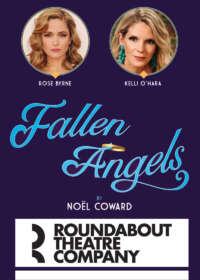
Discount Broadway Tickets For Fallen Angels
Fallen Angels Summary
- Show Status: Opening Soon
- Genre: Play
- Fallen Angels is 1 Hour and 40 minutes long, including an intermission of 15 minutes
- 8 Shows per week
- Previews Begin: March 27, 2026
- Show Opens : April 19, 2026
- Show Closes: June 7, 2026
Comedic play about two women rediscovering their past love for the same man, leading to humorous misunderstandings and revelations about love and infidelity.
What's Fallen Angels Like?
Overview
Fallen Angels is a comedy by Noël Coward, first performed in 1925, that explores themes of love, infidelity, and the absurdities of social conventions.
Main Characters
The play revolves around two women, Julia and Jane, who were once in love with the same man, Maurice, but lost touch with him over the years. Both women are now married to other men.
The Plot
The play begins when Julia and Jane, close friends, learn that Maurice is returning to town. Both women are shocked to discover they still harbor feelings for him, leading to a comedic series of misunderstandings, jealousy, and flirtations.
As they reminisce about their past romantic entanglements with Maurice, their emotions get tangled up in hilarious ways. Both women are caught between their desires and their marriage commitments, leading to moments of comic chaos.
Comic Confusion
The humor is heightened by Coward’s sharp dialogue and witty exchanges. The tension builds as the two women plan to meet Maurice secretly, creating more comic confusion. Meanwhile, their husbands remain oblivious to their wives' inner turmoil.
Themes and Humor
The play ultimately highlights Coward’s ability to capture the complexities of human emotions with humor. Through the characters’ flirtations and misunderstandings, Fallen Angels examines the nature of love, desire, and societal expectations in a lighthearted and amusing way.
Conclusion
The fast-paced dialogue, sophisticated humor, and witty characters make Fallen Angels a timeless piece of comedic theatre.
Is Fallen Angels Good for Kids?
Fallen Angels is generally not considered suitable for young audiences. The play revolves around themes of extramarital affairs, female desire, and drinking, which may not be appropriate for younger audiences. While the humor is sophisticated and witty, much of it relies on adult situations and innuendo.
That said, teenagers and older audiences who enjoy classic comedies and Noël Coward’s sharp dialogue may appreciate the play.
Fallen Angels on Broadway Background
Fallen Angels has never appeared on Broadway until this production. Past notable international productions are below:
West End Premiere (1925)
Noël Coward’s Fallen Angels debuted at the Globe Theatre (now the Gielgud Theatre) in London on April 21, 1925. The play, a sharp comedy about two women anticipating the arrival of a former lover, sparked controversy for its open discussion of female desire and infidelity. The original cast featured Tallulah Bankhead and Edna Best. While critics had mixed reactions, the play found success with audiences.
Notable London Revivals
Over the years, Fallen Angels has had several successful revivals in the UK, including:
- 1967 Revival – Starring Joan Greenwood and Constance Cummings at the Duke of York’s Theatre.
- 2000 Revival – Featuring Felicity Kendal and Frances de la Tour at the Apollo Theatre.
Lack of a Broadway Production
Despite its popularity in London, Fallen Angels has never been staged on Broadway. However, it has had performances in the U.S., particularly in regional theatres and Off-Broadway.
Key U.S. Productions
- 1956 Off-Broadway – Staged at the Theatre de Lys (now the Lucille Lortel Theatre).
- 1999 at the Shakespeare Theatre Company (Washington, D.C.) – Starring Nancy Robinette and Veanne Cox.
- 2011 at the Pasadena Playhouse – Featuring Janie Dee and Julia Duffy.
While Fallen Angels never made it to Broadway, its humor and social commentary have made it a staple in Coward’s theatrical legacy.
Theatre Information
Todd Haimes Theatre
New York, NY 10019
Cast Members
- Julia Sterroll
- Rose Byrne
- Jane Banbury
- Kelli O'Hara
- Maurice Duclos
- Fred Sterroll
- Willy Banbury
- Saunders
Production Credits
- Playwright
- Noël Coward
Creative Team
- Director
- Scott Ellis